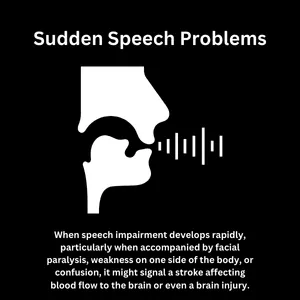

The Challenge of Communication
Communication is something many of us take for granted. We chat with friends over coffee, speak with colleagues during meetings, and express our needs to family members without a second thought. But for adults experiencing speech impairment in Forney, TX, these everyday interactions can become overwhelming challenges.
Speech impairment affects more than just the ability to speak—it impacts confidence, relationships, and quality of life. When words don’t flow easily, when thoughts remain trapped by uncooperative muscles or neurological disorders, the frustration can be immense.
No one needs to face these challenges alone. Understanding speech disorders is the first step toward finding effective solutions that can transform lives and restore the joy of communication.
Table of Contents
The Reality of Adult Speech Disorders
Speech Disorders Are More Common Than You Think

Speech disorders affect millions of Americans. Adult speech impairments can develop suddenly or gradually, affecting people from all walks of life regardless of education or background. Many adults suffer in silence, believing their speech impairment is something they must simply endure.
Speech problems can manifest in various ways, from difficulty forming specific sounds to complete inability to verbalize thoughts. These challenges often stem from issues within the nervous system, affecting the complex coordination required for fluent speech production.
The impact of speech impairment extends far beyond just communication difficulties. Adults with speech disorders often report feeling isolated, misunderstood, and frustrated in social situations that others navigate with ease.
The Real-Life Impact of Speech Disorders
Speech impairment can turn simple moments—like reading to your children or presenting at work—into overwhelming challenges. Slurred speech, difficulty speaking, or speech problems in adults may stem from neurological disorders affecting the nervous system, including conditions like apraxia of speech or damage to the vocal cords. These speech disorders impact verbal communication, often leading to isolation and mental health struggles. Without appropriate interventions, adult speech impairments can worsen and further limit the ability to speak. Speech therapy, support groups, and technology offer hope.
Effective Treatments Are Available Locally
The good news is that most speech disorders respond well to treatment. Therapy with a qualified speech language pathologist can make a tremendous difference in managing or even overcoming many types of speech impairment.
Our local speech therapy services offer personalized treatment plans that address your specific speech issues. From techniques that improve muscle coordination to strategies that enhance fluency disorders, professional help is available right here in our community.
Modern approaches to treating speech impairment combine traditional therapy with innovative technology, ensuring comprehensive support for every patient. With proper diagnosis and consistent therapy sessions, many adults experience significant improvements in their communication skills and quality of life.
Common Speech Disorders in Adults
Stuttering: When Words Don’t Flow

Stuttering is a fluency disorder marked by sound repetitions, blocks, and slow speech or rapid speech that can severely affect speech production. Though often linked to childhood, speech problems in adults are common and may be worsened by stress or neurological disorders. Speech therapy sessions help manage anxiety, pacing, and breathing to improve communication.
Apraxia of Speech: When the Brain and Mouth Don’t Coordinate
Another cause of impaired speech is apraxia of speech, where the brain responsible for planning speech doesn’t coordinate with the mouth. Even with normal muscle strength, people may struggle with slurred speech, rhythm, and timing. Often caused by brain injury, degenerative diseases, or a brain tumor, treatment requires consistent work with therapy to rebuild verbal communication.
Dysarthria: When Muscles Weaken
Dysarthria is a speech impairment marked by slurred speech and slow speech due to muscle weakness that affects speech production. It’s often linked to neurological disorders like multiple sclerosis, cerebral palsy, amyotrophic lateral sclerosis, or a brain injury. Treatment may involve speech therapy, language therapy, and exercises to improve communication and support the ability to communicate through clearer verbal communication.
Voice Disorders: When Sound Production Is Affected
Voice disorders involve problems with the quality, pitch, or volume of the voice. These unusual vocal symptoms can significantly impact how others perceive and understand speech.
Common voice disorders include vocal nodules from overuse, spasmodic dysphonia causing voice breaks, and vocal cord paralysis resulting in breathy or weak speech. Risk factors include smoking, vocal cord strain, allergies, and certain neurological conditions.
Treatment often involves a combination of vocal cord exercises, lifestyle modifications, and in some cases, medical interventions. A speech therapist specializing in voice disorders can design a treatment plan to address these specific speech issues.
Aphasia: When Language Processing Is Disrupted
Aphasia is a language disorder that affects the ability to understand or formulate language. This condition stems from damage to the parts of the brain responsible for language processing, most commonly from stroke or head injury.
People with aphasia may struggle with word-finding, substitute incorrect words, or have trouble expressing complete thoughts. This speech impairment can affect reading and writing abilities as well as verbal communication.
Treatment approaches include intensive language therapy, group therapy sessions, and the use of communication aids or communication apps to support expression. Early diagnosis and prompt medical attention following a brain injury can significantly improve outcomes.
Less Common But Serious Speech Disorders
Sudden Speech Problems: When to Seek Emergency Care

Sudden speech problems in adults can indicate serious medical conditions requiring immediate attention. When speech impairment develops rapidly, particularly when accompanied by facial paralysis, weakness on one side of the body, or confusion, it might signal a stroke affecting blood flow to the brain or even a brain injury.
Other serious conditions that can cause sudden speech problems include transient ischemic attacks (mini-strokes), severe infections affecting the brain, or acute manifestations of multiple sclerosis. A brain tumor, issues with the vocal cords, or unusual vocal symptoms can also contribute to a sudden speech impediment. These conditions represent a medical emergency requiring immediate evaluation.
If you or a loved one experiences the abrupt onset of speech impairment, don’t wait—call 911 or go to the nearest emergency room. Prompt intervention can be life-saving and may prevent permanent speech and language deficits.
Neurological Speech Disorders: Complex Causes
Speech problems in adults may signal serious neurological disorders like Wilson’s disease, Lyme disease, or Lou Gehrig’s disease, which affect speech through muscle weakness, abnormal brain functioning, or involuntary movements. These conditions can also involve the peripheral nervous system, vocal cords, or even stem from a past head injury or medical history that impacts the ability to speak.
A speech language pathologist, medical professionals, and support groups can help manage speech impairment. Whether caused by a speech impediment, impaired speech from Down syndrome, or other neurological challenges, therapy sessions, technology, and addressing the underlying cause improve communication skills and the ability to communicate more effectively.
Finding Help in Forney, TX
Local Speech Therapy Resources
Residents have access to excellent speech therapy services right in our community. Local speech specialists treat adult speech impairments with personalized care plans tailored to individual needs.
Our speech language pathologists understand the unique challenges faced by adults with speech impairment and provide compassionate, evidence-based care. Many insurance plans cover speech therapy, making professional help accessible for most community members.
Initial assessments typically involve evaluating your speech production abilities, identifying specific challenges, and developing a comprehensive treatment plan to address your speech impairment effectively.
What to Expect in Speech Therapy

Speech therapy sessions for adults typically last 45-60 minutes and focus on specific exercises to improve your particular speech issues. Your therapist will work with you to develop strategies that address your unique speech impairment challenges.
Depending on your condition, you might practice vocal exercises, learn to speak slowly and deliberately, or work with facial expressions and articulation techniques. Progress is typically gradual but steady with consistent practice and professional guidance.
Most importantly, speech therapy provides not just technical skills but also the confidence and strategies needed to navigate social situations despite speech impairment. This comprehensive approach helps address both the physical and emotional aspects of communication challenges.
Supporting Loved Ones with Speech Disorders
If a family member struggles with speech impairment, your understanding and patience are invaluable. Allow them time to express themselves without interrupting or finishing their sentences.
Maintain natural conversation flow rather than drawing attention to speech problems or difficulties. Simple adjustments like reducing background noise and maintaining eye contact can make communication significantly easier.
Encourage them to continue speech therapy and practice their exercises, perhaps even participating in support groups where they can connect with others facing similar challenges. Your consistent encouragement can make a tremendous difference in their recovery journey.
Technological Advances in Speech Therapy
Assistive Technology: Bridging Communication Gaps
For some adults with severe speech impairment, assistive technology offers life-changing possibilities. Modern electronic devices can convert text to speech, amplify quiet voices, or even interpret slight movements to help those with limited ability to speak.
Communication aids range from simple picture boards to sophisticated computer systems controlled by eye movement. These tools can help restore the ability to communicate effectively even when traditional speech remains challenging.
Many speech therapists in Forney can help evaluate which technology might best suit your needs and provide training on using these tools effectively. These resources can dramatically improve quality of life for those with significant speech problems.
Digital Therapy Tools: Practice Beyond Sessions
Technology now allows for practice between formal speech therapy sessions through specialized apps and programs. These digital tools provide feedback on speech production and encourage consistent practice of key skills.
Many speech language pathologists now incorporate these technologies into their treatment plans, assigning specific exercises to practice at home. This approach accelerates progress by increasing the frequency and consistency of practice.
The combination of professional guidance and technological support creates an effective framework for addressing speech impairment. This integrated approach helps many adults achieve communication abilities they once thought impossible.
Moving Forward with Confidence
Early Intervention Makes a Difference
When it comes to speech disorders, early diagnosis and treatment yield the best results. If you notice changes in your speech or language skills, seeking professional evaluation promptly can prevent further deterioration.
Many speech issues respond best to treatment before they become entrenched habits or cause compensatory behaviors. A speech therapist can identify underlying cause factors that might not be immediately obvious.
Don’t dismiss speech changes as “just getting older” or “having a bad day”—especially if symptoms persist for more than a few weeks. Professional evaluation can determine whether your speech issues require attention.
The Emotional Journey of Recovery
Improving communication skills involves not just physical practice but emotional resilience. Many adults with speech impairment experience frustration, embarrassment, or anxiety that can hinder their progress.
Support groups for people with speech disorders can provide valuable emotional support and practical tips from others on similar journeys. Sharing experiences with people who truly understand your challenges can be incredibly validating and motivating.
Remember that progress may not always be linear—some days will be better than others. Celebrating small victories and maintaining perspective during setbacks are important parts of the recovery process.
Conclusion: Your Voice Matters
Living with speech impairment doesn’t mean living without a voice. With proper diagnosis, appropriate interventions, and consistent practice, most adults can significantly improve their communication abilities.
Forney’s supportive community and excellent speech therapy resources provide the perfect environment for addressing speech disorders. You don’t have to navigate these challenges alone—professional help and community support are readily available.
If you or someone you love is experiencing speech issues, reach out today to schedule an evaluation with one of our experienced speech therapists. Taking that first step toward improving your communication skills could be the beginning of a transformative journey.
Call our clinic today to schedule your confidential speech and language evaluation. Our team of dedicated speech language pathologists is ready to help you find your voice again.





